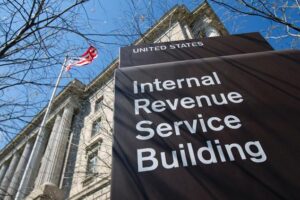Title: Shifting the Balance: The IRS Cuts and What It Means for American Taxpayers

In a dramatic shift, the Internal Revenue Service (IRS) has announced plans to reduce its formidable workforce of 90,000 agents by half. This development arrives on the heels of a controversial initiative proposed by former President Joe Biden aimed at bolstering IRS personnel by 87,000 agents, concealed within the larger framework of the Inflation Reduction Act. Critics argue this expansion was part of an attempt to intensify tax enforcement against ordinary Americans, with reports of military-style training for IRS agents fueling concerns of overreach.
At Extreme Investor Network, we delve deeper into the implications of this downsizing and how it could signal a victory for everyday taxpayers. The proposed IRS expansion prompted backlash and public discourse around the balance of power between the federal government and its citizens. Many view the agency’s aggressive posture as a form of government overreach, causing vast anxiety among American taxpayers. By shedding agents, the IRS might just be reclaiming its original mission of compliance rather than intimidation.
The IRS’s Changing Landscape

The tension surrounding the IRS has not gone unnoticed on the political stage. Former President Trump previously enacted a hiring freeze within the agency and cut the ranks by 7,000 probationary employees. The recent announcement for further layoffs, which will include voluntary buyout packages, reflects a significant strategic pivot. As this happens, it’s essential to recognize the potential consequences for both the IRS agents and the average taxpayer. With buyouts not being available until after the upcoming tax filing deadline, many agents are left in limbo.
Interestingly, some of these displaced agents may transition to roles within the Department of Homeland Security to assist with immigration enforcement—a novel approach in repurposing tax agents to tackle different national challenges.
The Reality of IRS Audits

As rumors swirl about an alleged IRS focus on wealthy individuals, data tells a different story. A staggering 63% of new IRS audits have targeted taxpayers earning below $200,000. This striking statistic underscores a fundamental truth: the IRS often directs its scrutiny towards the middle-class and small businesses, who lack the financial backing or savvy to navigate complex tax regulations.
This trend raises questions about the agency’s priorities and methods. Calls to protect the average American from draconian taxation measures resonate strongly within our community at Extreme Investor Network. Tax returns, it can be argued, become a form of interest-free loans to the government, leaving taxpayers vulnerable and deprived of the ability to invest their income throughout the year.
Understanding the Middle-Class Battle
The system places undue pressure on small businesses—often the backbone of the American economy—by burdening them with excessive regulations and tax obligations. For many, the tax filing process is a maze of confusion that risks penalty if not navigated correctly. Here at Extreme Investor Network, we advocate for reform that reverses this growing trend against the diligent middle-class taxpayer.
The conversation about taxation is not merely about numbers; it encompasses the very essence of economic freedom in the United States. Items that may seem as mundane as tax forms can carry significant implications for financial independence and stability.
Conclusion: A Future of Financial Empowerment
As the landscape of the IRS evolves, we at Extreme Investor Network encourage our readers to remain vigilant and informed. The ongoing scrutiny of the agency and the possible reduction of its powerful grasp over average Americans bring hope for a more balanced approach to taxation. The focus should rightly be on protecting the middle class and fostering a tax environment conducive to growth, rather than one mired in fear and confusion.
By keeping you informed and engaged, we hope to empower our readers to take control of their financial futures. Stay tuned for more insights and expert analyses as we navigate through these changing economic tides together.

